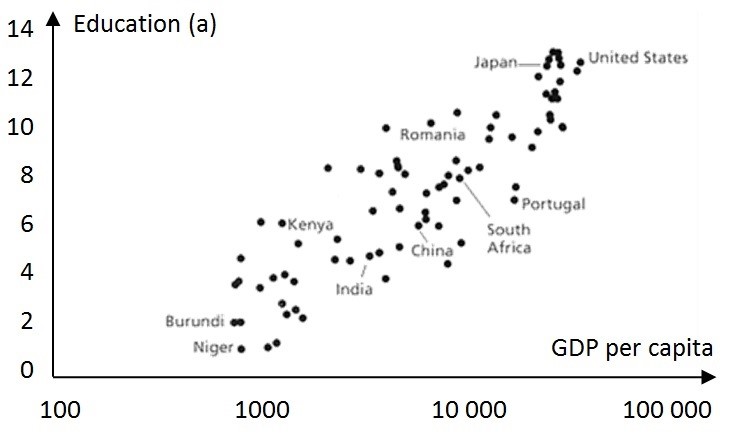Education & Employment PromotionKnowledge is power - why education matters!
Yet despite much success in primary school enrolment, over 124M children still do not receive any formal education, the quality of education is oftentimes insufficient so much so that over 250M children are lacking basic reading and math skills despite several years of education. What is more, education systems are too often misaligned with the demands of the labour market and lacking in financial efficiencies and robust management structures.
Therefore, education promotion at primary, secondary and tertiary levels are priority areas for international development corporation. Ensuring that education provides a maximum support to the wider world of work, governance and society requires a dynamic, flexible and robust educational system that adapts to the changing needs of the economy while offering inclusive and science based education.

Average years of schooling versus GDP per capita (USD). Logarithmic scale on horizontal axis. D. Pearson Addison-Wesley
Access
- Universal access to basic primary and secondary education
- Access for marginalised and vulnerable groups: special provisions
- Inclusion of financially underprivileged at all levels of education
Quality
- Relevance of curricular towards labour market
- Future oriented curriculum
- Quality educators: identify weaknesses in international comparison tests
System
- Dynamic
- Efficient
- Robust
- Sufficiently funded
- Stakeholder involvement
- Streamlined and effective education management system
our expertise
Luvent Consulting supports education policy and strategy reform and development with expertise in:
- National education coordination with decentralised approaches avoiding disintegration and inconsistencies while maximising inclusiveness and education outcomes:
- Establishment of National agencies, organisational development and national strategies for education. National coordination assures efficient and strategic management of resources, national education priorities and avoids undesired incentives.
- Decentralised education approaches to education management, resource allocation, and service delivery. Decentralized approaches are more likely than centralized approaches to yield greater inclusiveness and improved education outcomes.
- Policy, strategy and action plan development for national and regional education systems
- Education reforms: in particular, reforms on education planning, management, and system efficiency.
- Coordination structures for disintegrated education systems, responsibility allocation.
- Establishing flexible and dynamic systems for adaptability
- Stakeholder communication structures, notably industry, research, curricular development.
- Sustainable education financing, increasing efficiencies, reducing costs. new approaches to financing education: private sector partnerships, greater autonomy to public higher education institutions and more responsibility for raising funds, and developing their capacity to manage their financial affairs.
- Providing flexible pathways for graduates of lower levels to continue their studies at higher levels
Universities as well as institutions that teach specific capacities of higher learning such as colleges, technical training institutes, community colleges, nursing schools, research laboratories, centres of excellence, and distance learning centres.
Pressure on the tertiary sector is increasing, notably with the increase of primary and secondary education numbers, but also due to the pressure factors such as climate change adaptation, food supply, new diseases and health. Our focus here lies on:
- Development and operation of innovation and incubation Centres/Networks
- Integration into national and international networks
- Establishment and recognition of certification and quality standards
- Training of education managers and administrators
- Training of teachers and educators
- Inclusion of new and emerging trends notably in the fields of: Climate change, food sustainability, renewable energy and considerations for labour market demand and skill sets.
- Access to ICT and training in using new information and communication technology.
While enrolment has increased significantly since the MDGs in 2000 set it a major priority, the high rate masks serious deficiencies in the lack of access to education for vulnerable groups and equity in education as well as in retention rates, quality of education and knowledge gained. Luvent offers services to support.
- The reduction in dropout rates
- Improve enrolment, in particular in rural areas and of girls and vulnerable groups
- Improve the dynamic of the education system to account for migration patterns, population growth and language barriers
- Improve the quality of delivery of education, by providing better materials and improving education training.
examples
Training and skills development systems in developing countries are not fully equipped to produce graduates with competencies that are aligned to the needs of the labour market.
In many countries, the existing vocational training systems do not meet the needs of today’s society and economy: training is not geared to the standards required on the labour market and is not sufficiently practice-oriented, curricula are outdated, and the vocational training infrastructure is generally inadequate in terms of both quality and quantity. To address the challenges, the following aspects are addressed in the development cooperation.
- Review and design of curricular,
- German Dual Education system to include learner placement and on the job training programs,
- Coordination with industry and government departments responsible for trade and industry,
- Establish standards, diploma and certification systems validated by the industry,
- Strengthened ties and links with industry to identify demand for skills and education in the future, improve matching and leaner job placement, industry support in “on-the-job” training and internships.
- Gender mainstreaming, inclusion of vulnerable groups, consideration of diaspora and oversea workers for remittances.
- Infrastructure, renovation and equipment of schools for TVET, further training centres etc.
Increasing enrolment and access to education is critical for a society, to promote inclusive education. Unequal access to education remains pronounced, beginning at the basic education level, and compounded at the secondary level and above. Children who are unable to go to school tend to be from disadvantaged population groups. Girls and women are at a disadvantage in education in most developing countries, as are children and youth who
- are from poor families or from families that are at risk of sliding back into poverty,
- live in rural and remote areas,
- belong to ethnic and linguistic minorities,
- have disabilities, and/or
- are refugees or migrants.
Inclusive education requires strategies reaching beyond simply expanding the mainstream education system. Effective tools and programs include: education scholarships and stipends linked with conditional cash transfer programs have produced positive impacts, particularly when targeted at girls or poor households.
At Luvent Consulting we are therefore supporting projects in the following areas to strengthen equity in quality and access to education:
- Gender mainstreaming in education
- Education promotion in rural areas
- Lifelong learning
- Equity, Inclusion, Access for vulnerable Groups
- Non-formal basic education for adults
our services
- Project identification, formulation, appraisal, planning and pre-feasibility/feasibility studies
- Policy, strategy, action plan development, stakeholder consultation and planning
- Education system design and development at national, local and enterprise levels
- Program and project monitoring and evaluation, including social and economic impact analysis
- Institutional development and strengthening with capacity development for education managers and administrators.
- Improving quality of education delivery through capacity development and knowledge transfer to teachers and trainers.
- Development and implementation of innovative financing schemes, and improved legal frameworks
- Creation of management and labour market information systems
- Infrastructure planning, facility design and procurement, state of the art science based and innovative incubation centres for bioscience, ICT and others.
- Supporting certificates and standard development for education and science.
- Development and delivery of tailored training measures involving curriculum review
- Strengthening cross-institutional linkages and development of networks – nationally and internationally
- Technical and financial project management and implementation


